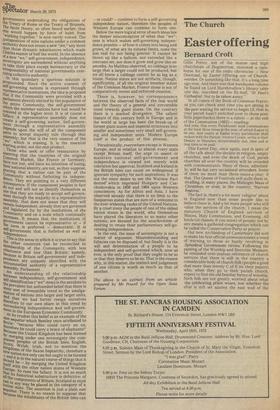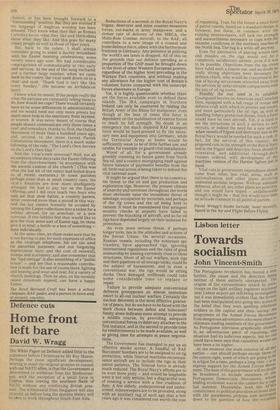The Church
Easter offering
Bernard Croft
Gillie Potter, son of the manse and high churchman of Hogsnorton, invented a racehorse for one of his radio chronicles — New Overcoat, by Easter Offering out of Churchwarden. Or something like that. It's a long time ago now. And there was that handsome volume he found on Lord Marshmallow's library table one day, inscribed on the fly-leaf, "St Paul's Cathedral: Not to be taken away."
In all copies of the Book of Common Prayer, as you can check next time you are sitting in the pew waiting for service to begin (if, that is, your parish hasn't switched over to those poor little paperbacks) there is a rubric -at the end of the Communion (1662) — reading:
And note, that every Parishioner shall communicate at the least three times in the year, of which Easter to be one. And yearly at Easter every parishioner shall reckon with the Parson, Vicaror Curate, or his or their Deputy or Deputies, accustomably due, then and at that time to be paid.
This Easter Day, once again, and in spite of all the talk about the decline in religion, empty churches, and even the death of God, parish churches all over the country will be crowded with communicants. Many of these, admittedly, will be but very occasional attenders. Some of them no more than three-times-a-year; if that. The Queen of Festivals still pulls them in, rivalling, in many places, the Midnight Mass of Christmas, or even, in the country, 'Harvest Festival.'
The fact is, there's a lot more 'religion' about in England now than some people like to believe there is. And a lot more people who still value the services of the church; I mean the statutory Church of England services of Matins, Holy Communion, and Evensong. All kinds (or classes, if you must) of people; not by any means a gathered congregation which can be called the Conservative Party at prayer.
Our new Archbishop of Canterbury did well to make his first official pronouncement a word of warning to those so busily revolving in Synodical Government circles. Following the passing of the Worship and Doctrine Measure, he reminded over-zealous reformers of church
services that there is still in the country a considerable body of church folk (people a good deal more than merely C of E on their papers)
who, when they go to their parish church, expect to find the old familiar forms of worship.
Such folk are not greatly worried about what the celebrating priest wears, nor whether the altar isstill set against the east wall of the
chancel, or has been brought forward to a freestanding" position. But they are worried if the language of Anglican worship has been debased. They know what they like; as Roman Catholics know what they like and Methodists know what they like. And this goes for many young people as well as those of riper years.
But, back to the rubric, I shall always remember going to assist a Surrey incumbent with his Easter morning celebrations; some twenty years ago now. We had considerable congregations of communicants at two early said services. At the end of the sung eucharist and a further large number, when we came back to the vestry, the vicar sank down on to a chair and said, "Thank God it isn't like this every Sunday." (He became an archdeacon later).
I knew what he meant, If the people really did what the parsons are constantly telling them to do, how would we cope? There would certainly have to be some differences in administration; and we would need not only more priests but much more help in the sanctuary from laymen, or women. It was never meant of course that people should communicate only three times a year; and nowadays, thanks to, first, the Oxford
Movement of more than a hundred years ago, and, second, to the more recent Parish Communion movement, there is a much wider following of the rule, -The Lord's Own Service on the Lord's Own Day."
And the vicar's new overcoat? Well, not all incumbents these days take the Easter Offering from the churchwardens "in accordance with the ancient custom of the church." (This was what the last bit of the rubric had boiled down to of recent. centuries.) In town parishes perhaps more than in small country ones, the vicar's finances are now more intelligently arranged. He had to pay tax on the Easter Offering; and I did once teach two boys who told me that their father, a country parson, never received more than a pound in this way. And the tax cannot honestly be avoided by turning the Easter collections into a ticket for a
holiday abroad, for an armchair, or a new overcoat. If the faithful feel they would like to give the vicar some sort of Easter egg, let them give it in kind; a bottle or a box of something — done individually.
At the same time, let them make sure that he is not having to pay for such expenses-of-office as the vicarage telephone, his car (as used for parochial purposes; and not forgetting depreciation here, and the cost of renewal), stamps and stationery; and also remember that his "tied cottage" is also something of a "public house" — and see that a reasonable contribution is made for the use of rooms there, lighting and heating and wear-and-tear, for a variety of church meetings. Then he also, on his recently raised minimum stipend, can have a happy Easter.
The Revd Bernard Croft has been a school chaplain. RAF padre, and a parson in town and, at present, corA n try.



































 Previous page
Previous page